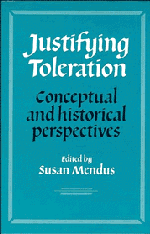Book contents
- Frontmatter
- Contents
- Preface
- Introduction
- 1 Scepticism and toleration in the seventeenth century
- 2 A more tolerant Hobbes?
- 3 Locke: toleration and the rationality of persecution
- 4 Toleration and Mill's liberty of thought and discussion
- 5 Rousseau and respect for others
- 6 The intolerable
- 7 Autonomy, toleration, and the harm principle
- 8 Friendship, truth, and politics: Hannah Arendt and toleration
- 9 Dissent, toleration, and civil rights in communism
- 10 Liberalism, marxism, and tolerance
- 11 Socialism and toleration
- Index
1 - Scepticism and toleration in the seventeenth century
Published online by Cambridge University Press: 20 May 2010
- Frontmatter
- Contents
- Preface
- Introduction
- 1 Scepticism and toleration in the seventeenth century
- 2 A more tolerant Hobbes?
- 3 Locke: toleration and the rationality of persecution
- 4 Toleration and Mill's liberty of thought and discussion
- 5 Rousseau and respect for others
- 6 The intolerable
- 7 Autonomy, toleration, and the harm principle
- 8 Friendship, truth, and politics: Hannah Arendt and toleration
- 9 Dissent, toleration, and civil rights in communism
- 10 Liberalism, marxism, and tolerance
- 11 Socialism and toleration
- Index
Summary
It is natural to suppose that there is – at the very least – a certain emotional kinship between a belief in the desirability of toleration and a sceptical attitude towards religious or ethical beliefs. At the back of many people's minds is a rough history of the modern world in which the dissolution of strongly held beliefs (typically, the relatively unified Christianity of the Middle Ages) was a precondition for extending toleration to men who would once have been attacked as heretics. This view has been given a more precise expression by a number of writers, particularly on the sixteenth century, who have pointed to the religious scepticism of figures such as Bodin or Castellio as an explanation of their advocacy of toleration as a solution to the religious wars of their time. I do not want in this paper to question the naturalness of this linkage, seen from some very long perspective; but I do want to remind us that the path to toleration through the meadows of late sixteenth- and early seventeenth-century scepticism was a surprisingly treacherous one, and that moral and religious scepticism may often be linked with a programme of what we would take to be excessive ideological repression. This in turn raises (I shall suggest) some problems for twentieth-century sceptics like (I imagine) most of us.
I want to begin with one of the first and most influential debates about toleration in post-Reformation Europe, which in many ways set the scene for writers during the next hundred or even two hundred years.
- Type
- Chapter
- Information
- Justifying TolerationConceptual and Historical Perspectives, pp. 21 - 36Publisher: Cambridge University PressPrint publication year: 1988
- 22
- Cited by



